Home » How to Care for Your Teeth After Getting a Dental Implant
Caring For Your Teeth After a Dental Implant Procedure
Dental implants are a popular and effective way to replace teeth that have been lost due to decay, injury, or other reasons. A dental implant is a small titanium post that is surgically placed into the jawbone and acts as an artificial tooth root which supports artificial teeth. Dental implants can be used to replace a single tooth, several teeth, or even entire arches of teeth. Not only are dental implants a great way to improve your smile, but they also provide many other benefits, including improved chewing and speaking ability, improved self-confidence, and improved oral health.What is a Dental Implant and What Are the Benefits?
Dental implants are small titanium posts that are surgically placed into the jawbone. The implant post acts as an artificial tooth root, providing a foundation for replacement teeth. The replacement teeth are typically made of porcelain and are custom-made to match the patient’s natural teeth in size, shape, and colour. Dental implants offer several benefits over traditional dentures. Unlike dentures, dental implants are permanent and do not require the use of adhesive to stay in place. Dental implants also provide a more secure fit than dentures and are less likely to slip or move in the mouth. Additionally, dental implants can help preserve the jawbone, as the implant post stimulates the bone and encourages bone growth. This helps to maintain a healthy jawbone and prevents the facial structure from changing.Preparing for a Successful Post-Implant Care Regimen
The success of a dental implant procedure depends on the patient’s willingness to follow a post-implant care regimen. Before the procedure, it is important to meet with a dentist to discuss any concerns and to determine the best post-implant care plan. After the implant procedure, the patient will need to follow the dentist’s instructions to ensure that the implant is successful. The first step in a post-implant procedure care regimen is to keep the area clean. The patient should brush and floss their teeth twice a day and use an antibacterial mouthwash. The dentist may also recommend that the patient use a water flosser or a special brush to clean around the implant. Additionally, the patient should avoid using tobacco products or drinking alcohol to reduce the risk of infection.






